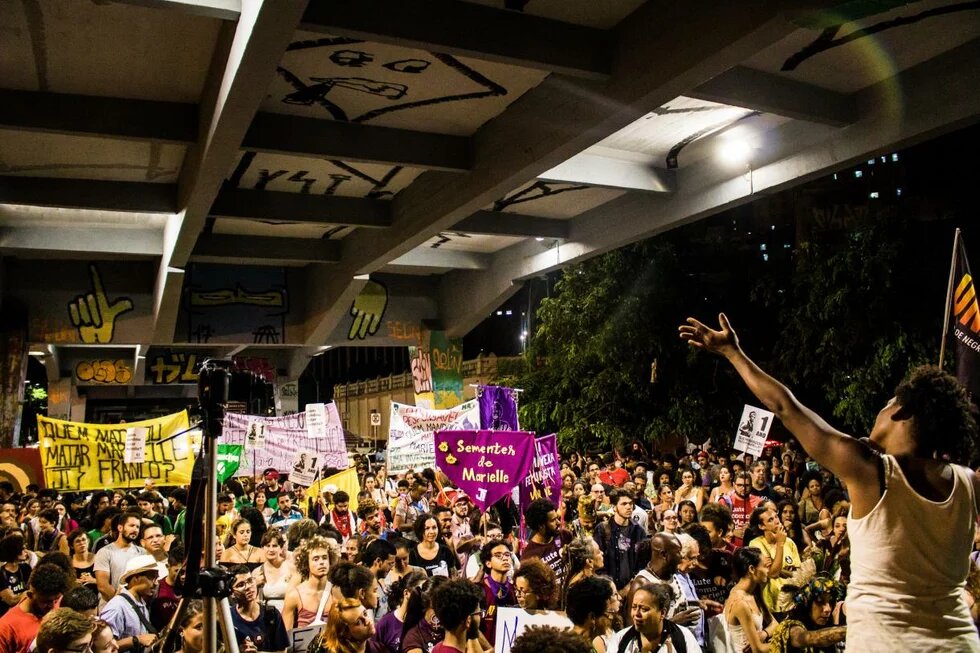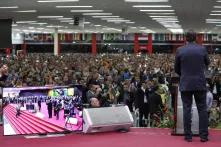In Brazil, misogynist discourse and attacks against female politicians have rapidly increased since the election of Jair Bolsonaro. Especially those who dare to challenge gender norms have become targets of online vitriol. A new law that criminalizes political gender violence may bring some relief, but may not be enough to turn the tide.

In 2018, election polls in Brazil showed that the choices made by women and men in the secrecy of the voting booth differed widely. In July of that year, 22% of men declared their intention to vote for Jair Bolsonaro, only 7% of women said the same [1]. In October, another survey showed that among male voters Bolsonaro received 37% of the expected votes. Among women, however, roughly half as many, 21%, gave their vote to Bolsonaro [2]. In 2022, this difference is repeated and amplified: while among men, the former left-wing president Luiz Inácio Lula da Silva and the current office holder Bolsonaro appear tied, among women, the difference is 51% for the former vs. 25% for the latter candidate [3].
This significant gender gap among voters in the case of Bolsonaro is a recent phenomenon. A survey conducted by BBC Brasil reveals that, in the elections of 1994 and 1998, Fernando Henrique Cardoso won among voters of both sexes, according to Datafolha polls at the time. This was repeated with Luiz Inácio Lula da Silva in 2002 and 2006 and with Dilma Rousseff in 2010 and 2014, according to the Brazilian Institute of Public Opinion and Statistics (Ibope).
The election campaign of 2018 sparked the greatest mobilization in the history of women’s movements, called #elenao (“not him”), organized on social media and carried out in more than a hundred Brazilian cities. This campaign reached voters from the entire political spectrum, trying to increase turnout and strengthening unity against the extreme right represented by then-presidential candidate Bolsonaro.
The movement, however, suffered a severe backlash due to the lack of understanding about the workings of social media. To employ a figure of speech also popular in Brazil, it is like “throwing the baby out with the bath water.” On that occasion, in 2018, the leadership of the parties opposing Bolsonaro’s candidacy barely knew and spoke of disinformation and intolerance on the internet. As such, the #elenao movement, and not the fake news surrounding it, was accused of elevating Bolsonaro's candidacy in the final stretch.
Women and men disagree on future of Brazil
When Bolsonaro was elected president of Brazil in the second round of the 2018 election, we simultaneously saw a spike in female political representation. 77 women were elected to the Chamber of Deputies, an increase of 51% compared to the previous term, and 161 women representatives were chosen by the population to occupy seats in State Legislative Assemblies, an increase of 41.2% compared to 2014 (Superior Electoral Court - TSE). We have never been so numerous, though we are still very few.
This points to split views between women and men regarding the direction the nation should take. On the one hand, women have never participated so much in politics, on the other hand, men struggle with the power shift. According to anthropologist Rosana Pinheiro Machado, “It is impossible to separate the ‘masculine crisis’ from the economic crisis. The economic crisis has inhibited men from fulfilling their perceived provider role, which is also threatened by the ascension of women.” This may explain the identification of greater numbers of Brazilian men with a president who expresses explicit misogyny.
It is necessary to understand that true political change depends on the participation en masse of women and that political gender violence (online and on the streets) is an instrument to drive us away, and so preventing change from happening. If broader society does not demand that women are seen as citizens, there is no way to imagine a virtual environment different from what we have today.
The election of an openly misogynist president in 2018 opened the floodgates for violence against women in politics. We saw sexism and misogyny serve as elements of mobilization and social cohesion to legitimize a right-wing political project. Afterward, we experienced the most extreme and emblematic act of violence in recent Brazilian politics: the assassination of Councilwoman Marielle Franco, on 14 March, 2018. Four years later, we still do not know who ordered Marielle’s killing and we know that her murder haunts all of us who continue fighting. Beyond her death, the profaning of the memory of Marielle is permanent: online, on the streets and in parliaments, the extreme right takes turns to commit offenses and aggressions.
Let’s speak, then, of violence as a method amplified by actors that feel threatened by the political rise of women and their electoral choices. In an article published in the book Sempre foi sobre nós - relatos da violência política de gênero (It was always about us - Reports of political gender violence),[4] edited by me, Dilma Rousseff mentions a quote by Kate Manne that I like. She says that it is naive to interpret misogyny as hatred and aversion toward all women, when, in fact, it is only aimed at women who dare to challenge dominant norms, for example that power should only be wielded by men. The philosopher Marcia Tiburi affirms that “Sexism in advertising is the form of sexism in the era of politics reduced to advertising (...) In typical sexist politics, men need only to compete among themselves. When women appear to threaten their positions, or threaten them with the prospect of policy change, men turn to violent action, which is part of their history and which is essential to the performative politics of the time. (...) The characteristic of the overshadowed male is the misogynist stridency that returns the spotlight to shine back on him.” We call this misogynist stridency political gender violence. It happens in parliaments, on the streets, and above all, on social media. There is no way to disassociate it. The death of Marielle feeds the monsters on the internet, and the monsters on the internet feed the aggressors on the streets.
Facebook removed fake news – but not misogyny
A survey by MonitorA, a project of Revista AzMina and InternetLab monitored 347,400 posts on Twitter between November 15 and 18, 2020, which mentioned 58 men and women candidates competing in the second round of the election. I was running for mayor of Porto Alegre in that election, and 90% of the tweets that included personal attacks were directed at me. The same study was not done on Facebook, but in 2018 as well as in 2020, judges ordered the company to remove a number of viral posts about me containing fake news - but not of any other misogynist content, such as comments on my body, hair and private life.
Every time political gender violence is condoned and our aggressors are rewarded with mandates or are not punished, they feel approval, therefore becoming even more violent. When the 2020 election was over, for example, I thought it would take a long time for a woman in public life to go through similar violent situations such as I had gone through, at least in an institutional environment. Only shortly thereafter, however, Representative Isa Penna (PCdoB-SP) had her breasts grabbed by Representative Fernando Cury (UB-SP) in the chamber of the Legislative Assembly of São Paulo. When she denounced the action, she had to request silence before the assembly, which was indifferent to the violence she had just suffered, even though it was well documented. Representative Fernando Cury was not punished. A new boundary had been breached with this violation of Isa within the assembly hall.
Certainly, feminist movements and women’s organizations have improved their methods and means of reporting offences.Today, expressions of political gender violence and fake news are frequently used, while they were ignored in 2018. In 2021, the National Congress passed a law that criminalizes political gender violence, which could have some impact on the elections of 2022. But the truth is that we will never punish someone for the crimes committed against us. In the country, in which the person behind the assassination of Marielle Franco roams free, how can we really strengthen mechanisms, which curb political gender violence?
This article was originally published in Portuguese on br.boell.org and belongs to the dossier by our Rio de Janeiro office, “Does Democracy Accept Terms and Conditions? 2022 Elections and Politics with Algorithms” - available here (in Portuguese). It was translated by Jeremy Smith.
References
[1]Ideia Big Data poll conducted 20 to 23, 2018. Poll registered with the Supreme Electoral Court (TSE) under number BR-04178/2018.
[2]DataFolha poll conducted 26 to 28 July, 2018, registered with the TSE under number BR-08687/2018.
[3]FSB poll conducted 27 to 29 May. Registered with the TSE under number BR-03196/2022.
[4]Sempre foi sobre nós: relatos da violência política de gênero. Edited by Manuela d'Ávila. 2nd edition - Rio de Janeiro: Rosa dos Tempos, 2022.

